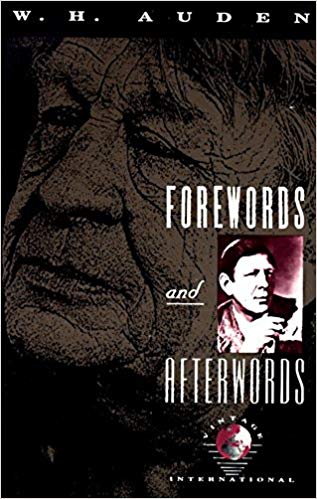
Of all writers, poets have the poorest prospect of earning a living by their work alone. The market for verse is very small, and shrinking, and the patrons of yesteryear – the Roman general, the medieval monarch, the Church – have largely vanished from the scene. For most of his life, Wystan Hugh Auden supplemented his poetry earnings by teaching, and by writing literary criticism and “forewords and afterwords” to new publications. This aptly titled collection of those writings did not appear in print until 1973, the year of Auden’s death, but its selection of prose writing – culled mostly from The New York Review of Books and The New Yorker – reaches back to the early 1940s, giving us a broad sampling of Auden’s reading, and the incredible breadth of his learning.
Consider the opening essay, “The Greeks and Us,” written as an introduction to The Portable Greek Reader. Auden belonged to the last English generation to be educated in Greek and Latin, and this loss has had a profound impact on our aesthetic sensibilities, for the writers of the past cut their teeth translating into English famous passages from Plato and Sophocles, Ovid and Horace, and without that fluency, the rhythms of Greek and Latin are lost, only the ideas communicated. “The aesthetic loss in translation from one language into another is always immense,” Auden tells us; “in the case of languages and cultures as far apart as Greek and English, it becomes practically fatal; one can almost say that the better a translation is as English poetry, the less like Greek poetry it is (e.g., Pope’s Iliad) and vice versa.” What, then, will classical studies consist of in the modern age? What can the Greeks still teach us? In a word, civilization:
There is no single Greek literary work of art as great as The Divine Comedy; there is no extant series of works by a single Greek literary artist as impressive as the complete plays of Shakespeare; as a period of sustained creative activity in one medium, the seventy-five-odd years of Athenian drama, between the first tragedies of Aeschylus and the last comedy of Aristophanes, are surpassed by the hundred and twenty-five years, between Gluck’s Orpheus and Verdi’s Otello, which comprise the golden age of European opera: nevertheless, the bewildered comment of any fifth century Athenian upon our society from Dante’s time till our own, and with increasing sharpness every decade, would surely be: “Yes, I can see all the works of a great civilization; but why cannot I meet any civilized persons? I only encounter specialists, artists who know nothing of science, scientists who know nothing of art, philosophers who have no interest in God, priests who are unconcerned with politics, politicians who only know other politicians.”
The Greek concept of education – so evident in Auden’s time, so absent in our own – was inimical to specialization. The danger, Auden tells us, is that we will develop one aspect of ourselves – whether aesthetic, practical or religious – to the exclusion of the others.
Auden himself embodies this desire for maximum scope: his essays cover history, theology, poetry, opera and philosophy with equal felicity. In “The Protestant Mystics,” written as an introduction to a book of the same title, he demonstrates a profound appreciation for religious faith, which he views as the primary impetus for artistic creation:
The vision of the splendor of creation, like all kinds, lays a duty upon one who has been fortunate enough to receive it, a duty in his turn to create works which are as worthy of what he has seen as his feeble capacities will permit. And many have listened and obeyed. It has been, I am quite certain, the initial cause of all genuine works of art and, I believe, of all genuine scientific inquiry and discovery, for it is the wonder which is, as Plato said, the beginning of every kind of philosophy.
If this is an expression of religious devotion, it is mild, non-doctrinaire. “Non-doctrinaire” seems, in fact, to describe his entire outlook on life, though that attitude extends to doubt as well:
In relation to any institution, ecclesiastical or secular, on all matters of fact and theory concerning which we know ourselves to be ignorant, and in all matters of conduct where uniformity is obviously necessary or convenient, we are or ought to be catholics (with a small c). To doubt for the sake of doubting, to differ for the sake of being different is pride. Private judgment is a meaningless term, for no one is omniscient and omnipotent, and every man derives most of his thoughts, opinions and principles from others. Obedience to some authority is inescapable; if we reject the authority of tradition, then we must accept the authority of local fashion.
I am reminded of Matthew Arnold, whose personal definition of literary criticism involved defending the classics “against the fashions.”
Readers who come to these essays, as I did, hoping to learn more about Auden the man will be gravely disappointed. Again and again he expresses the opinion that a writer’s personal life and work ought to be entirely separate, so far as the public is concerned, and that the posthumous publication of a writer’s journals or correspondence is an unpardonable violation of their privacy. If Auden the man recedes from us, his mind is nonetheless on full display, and we turn the final page grateful for the encounter.